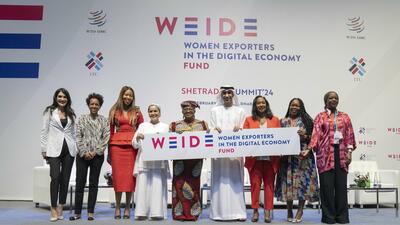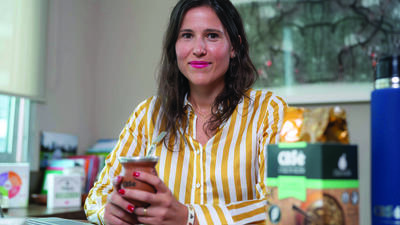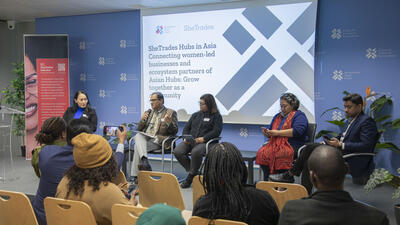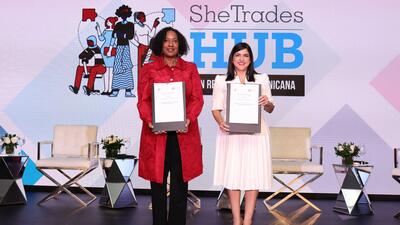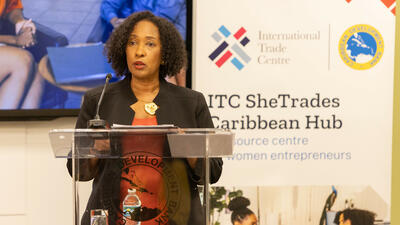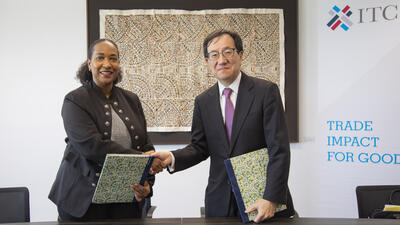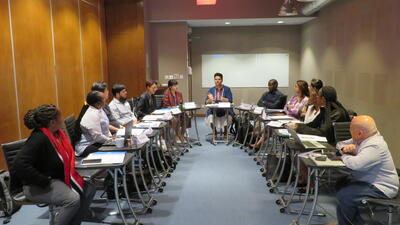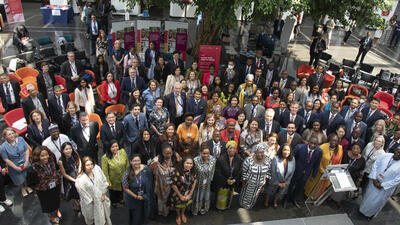
SheTrades Summit celebrates women in international trade
Abu Dhabi, the United Arab Emirates - ITC Executive Director Pamela Coke-Hamilton delivered the opening remarks for the SheTrades Summit.
Good morning, everyone. I’m delighted to welcome you to the opening of our SheTrades Summit in beautiful Abu Dhabi and would like to thank H.E. Dr. Thani Ahmed Al Zeyoudi for the warm welcome.
Before we begin, I would also like to thank the World Trade Organization for their partnership in bringing to you these two exceptional days.
I would also like to extend my gratitude to our esteemed partners, the Government of UAE, Visa, and Dubai Economic Development Corporation, whose invaluable support made this event possible.
Since SheTrades began in 2015, it has been changing the conversation around trade and women’s economic empowerment. But it’s done far more than that. The initiative has delivered concrete results around the world. It has changed the lives of women entrepreneurs in so many of our partner countries.
SheTrades is now the linchpin of ITC’s gender moonshot, which is how we refer to the big strategic pushes we’re making over the coming years to ensure that changing trade really does end up changing lives.
We’re doing that by making sure that the work we undertake doesn’t just stay at the “high level,” far removed from the people involved—but is actually shaped alongside the people we serve. And in every project we launch, in every step we take, we’re ensuring that this work is locally led, locally owned, and locally relevant, because this is the only way that change can last.
It’s why this SheTrades Summit isn’t just made up of ministers and agency chiefs like myself. Among its biggest stars are the women entrepreneurs themselves, and the business support organizations who work alongside them. And these are voices that we need to hear more of, especially ahead of WTO ministerial conferences.
This SheTrades Summit is both a celebration and a call to action: a chance to see where we’ve been and propel this initiative into an exciting new phase. And having it in the UAE is, in many ways, a chance for us to come full circle.
Our very first SheTrades Hub—where ITC partners with local host institutions to support women-led businesses—was launched in Dubai six years ago, almost to the day, to serve the Middle East and North Africa region.
Today, we have a full 17 Hubs around the world, and this afternoon, you’ll get to see our inaugural MENA Hub begin a new chapter. I can’t wait to see what lies in store for the region and its women entrepreneurs.
And that’s just one of the many highlights you’ll witness over the coming days.
From a full-fledged Innovation Festival to the launch of a new publication on financial inclusion…
From a first glance at our gender-responsive public procurement campaign with UN Women to the establishment of a new fund with the WTO for women exporters in the digital economy…
Get ready for the ride of a lifetime!
But first, I want to share a few reflections on where we’re heading and why we felt it was so critical that this conversation take place in the UAE, especially ahead of the WTO Ministerial Conference. These reflections have to do with one driving theme: the value of innovation.
You’ll hear me make this point a lot over the next two days: how by innovating, whether it’s in the green transition or the digital transition, the creative industries or the sports sector, the private sector or the policy arena, we cannot afford to continue with our old ways of working.
The last time I was in the UAE was for the UN climate conference in Dubai, just a few months ago. That was our chance to see how well the Paris Agreement is working and what must change to ensure we head off the worst of the climate crisis.
And while news headlines focused on the debate over how to address the big and complex issues – like climate finance and the transition away from fossil fuels – I want to draw your attention to another part of that document. In Dubai, Parties were encouraged to “implement climate policy and action that is gender-responsive, fully respects human rights, and empowers youth and children.”
Let me say that again: gender-responsive, fully respects human rights, and empowers youth and children.
In other words: unless we tap into the expertise of women everywhere, governments have recognized that we will fall short of the Paris Agreement’s objectives. And this time, we won’t get a chance at a do-over.
So let’s acknowledge that we are at a turning point: otherwise, we will soon be living the consequences of our actions and of our inaction. That’s why you’ll be hearing much more about women-led businesses’ role in helping achieve a green transition, one that gets us that much closer to net-zero, during our Summit.
Second, I want to take a look at what makes women’s economic empowerment such a transformative concept. It’s because women’s economic empowerment isn’t about quick fixes or patchwork progress: it’s about coming together to change the very way we think about the world.
It’s about pushing back against the maxim that “the past is prologue.”
It’s about understanding that we’re stronger together, and that partnerships are the source of our power.
The entrepreneurs we support, from farmers and textile manufacturers to health workers and tech innovators, to the athletes, artists, and creators, all benefit from this collective effort. Every one of their stories matters and gives us inspiration for what lies ahead.
Here’s one example that illustrates the mindset shift we’re looking for, and what makes it possible. It comes from my home country, Jamaica. As I’m sure you’ll know, we have a very proud history in the world of sports, especially when it comes to our women.
Jamaica has given us the likes of Shelly-Ann Fraser Price. Veronica Campbell Brown. Alia Atkinson. Konya Tajae Plummer.
These women athletes changed what we thought was possible on the track, in the pool, and on the football pitch. Their successes are legion and today, women athletes around the world are finally beginning to get the recognition that has long been their due.
But these success stories aren’t just about the victories on match day. As any athlete will tell you, whether it’s an individual medal or a team win, whether it’s a heart-breaking loss or an unexpected setback, there’s a reason their coaches always remind them that “there’s no I in team.”
Because every medal won, every personal best reached, and every challenge overcome, comes from a collective effort. Their support systems and partnerships have helped these extraordinary athletes channel their inner talent and grit and use them to show the world that women’s economic empowerment may finally be within our grasp.
We’ve channelled this same approach into our work under ITC’s SheTrades Initiative. Every milestone we’ve reached, every woman entrepreneur we’ve helped, is because our partners who have been with us every step of the way.
We’ve been fortunate to have the generous support of funders and partners who are co-champions of this vision, including the United Kingdom, the Republic of Korea, Mastercard, Germany, the European Union, UPS, FAO, Visa, DEDC, the Netherlands, Japan, Unilever, Switzerland, Iceland, the United Arab Emirates, Canada, Ireland, Norway, Sweden, and the EIF, who not only make it possible to do this work but inspire us every day with their commitment to the ideals that underpin SheTrades.
Together, we have built a collective force, propelling us towards a future where women in trade are not just participants but leaders and changemakers.
And while we have many things to be proud of, an even more exciting journey awaits, together.
Third, I want to talk about why, whether it’s tackling the climate crisis, reshaping the trading system, or paving the way for more gender-responsive procurement, we need a fresh take on how we think about policy.
So often—too often—we hear the same tired refrains: that it’s too hard, too expensive, too politically sensitive to change the rules of the road. That the policies and systems we have exist for a reason. That it isn’t the right time to rewrite the playbook that got us this far.
The women-led and women-owned businesses know just how hard, how expensive, and how politically-sensitive it is. And rather than walking away, they’re doubling down on their efforts, and they’re transforming their communities and the wider world in the process.
Now it’s our turn to do our part.
We have just 48 hours together at this SheTrades Summit, and that means we need you to make these 48 hours count. We need you to tap into your own innovative spirits and bring that to every aspect of this Summit. Don’t hold back, and don’t be afraid to dream big.
Thank you.





